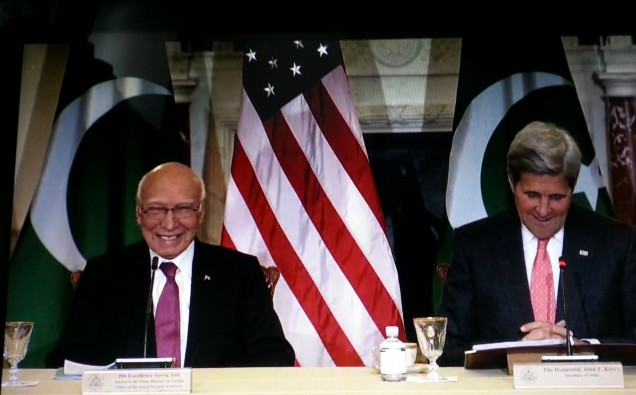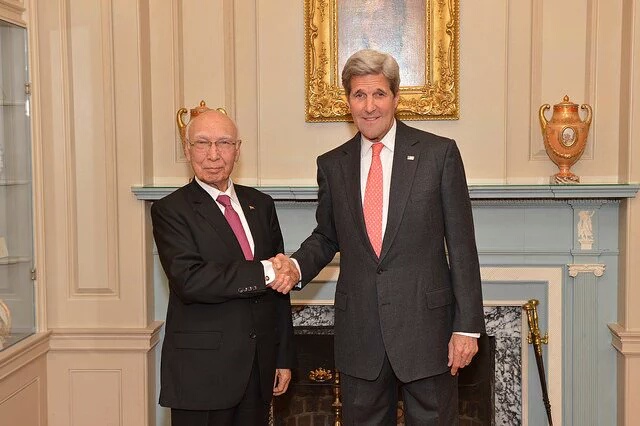
February 29, 2016
The United States hosted a high-stakes strategic dialogue with Pakistan on Monday, with its top diplomat John Kerry vowing support for the key South Asian country’s fight against terror.
“Our nations are committed to combating terrorism wherever it is, and whenever it endangers the lives of innocent families and communities,” Secretary of State Kerry said, sitting alongside Pakistan’s advisor on Foreign Affairs Sartaj Aziz.
“As long as that threat remains, protecting our people is going to be at the top of our agenda,” Kerry added.
Kerry, who last week defended the Obama Administration’s deal to sell eight F-16 fighter jets to Pakistan, described cooperation along Pakistan’s borders as “absolutely essential.”
“We are going to continue efforts to promote stability and defeat those who foment extremism and violence.”
India and some Republican lawmakers have voiced their opposition to the prospective sale of F-16 aircraft to Pakistan but the U.S. State Department has made it clear that the administration wants to go ahead with the sale, citing Pakistan’s critical efforts against a variety of terrorists along the Afghan border.
For his part, Foreign Affairs Advisor Aziz expressed Islamabad’s appreciation for the US support in enabling the country’s capacity to fight terrorism and noted that the new additions of F-16 jets would enhance Pakistan’s ability to fight terrorists.
“We see this contribution as a justifiable investment by the United States towards regional security and for its own security. To this end, we strongly believe that continued US participation in arrangements meant to enhance our Counterterrorism capacity not only help Pakistan but also advance the US interests.
“We are grateful to you Secretary Kerry for your recent positive testimony on the Hill. We appreciate the public assessment of the US leadership in response to Congressional inquiries that Pakistan has used the F-16s effectively against the terrorists in the region. The prospective sale of F-16s will strengthen Pakistan’s capabilities to successfully continue these vital operations for our mutual benefit and stability in the region.”
Opening the strategic dialogue earlier, Kerry noted, for the bilateral ties to reach their potential the two countries also have to build a relationship that is multi-faceted.
“We can and we should work together on a range of shared priorities including trade, investment education, energy law enforcement regional stability.”
He reiterated his personal commitment to expanding and deepening the US-Pakistan relationship.
“Our strategic dialogue is totally in keeping with this kind of broad-based partnership.”
He highlighted the support for participation of Pakistani women in the economic field and at the outset of his remarks acknowledged the achievement of Pakistani filmmaker Sharmeen Obaid Chinoy, who won here second Oscar for a documentary advocating ending violence against women.
“We are going to continue efforts to promote stability and defeat those who foment extremism and violence. In this connection, United States appreciates Pakistan’s support for efforts to promote reconciliation in Afghanistan.
Cooperation along Pakistan’s borders is absolutely essential, he said.
“We recognize the extraordinary and real sacrifices that Pakistan’s military- especially in operation Zarb e Azb – and the ongoing missions in North Waziristan.”
The United states has pledged $ 250 million to help rebuild communities displaced by the fighting, he added.
“We will also continue to coordinate with Pakistan on the overall counterterrorism strategy.
“We recognize that every country can do more to intensify, destroy and defeat violent radical extremists.”
“We welcome Pakistan’s commitment not to differentiate between terrorist groups in the implementation of the strategy (National Action Plan).”
He said groups like the Haqqani network and Lashker e Taiba, seek to undermine Pakistan’s efforts to foster strong positive relations with its neighbors.
These groups are literally stealing the sovereignty of the nation and future of its people, he added.
Non-proliferation, nuclear safety is an obvious concern for both the countries.
“We look forward to Prime Minister Nawaz Sharif’s participation in the nuclear security summit next month.”
The chief American diplomat underscored the vitality of the US-Pakistan cooperation to regional stability by echoing Prime Minister Sharif’s statement last year that “a close and enduring partnership between Pakistan and the US is a strategic imperative for achieving lasting peace and stability in our region and beyond.”
Advisor Sartaj Aziz spoke of the importance of a vibrant US-Pakistan relationship in the bilateral perspective. Aziz cited Pakistan’s pivotal fight against terror and the Nawaz Sharif government’s pledge to foster peaceful ties with neighboring countries including India.
Islamabad, he said, has taken some “important” steps in the aftermath of January 2, 2016 Pathankot attacks on an Indian airbase that disrupted the agreement on resumption of dialogue between the two South Asian neighbors.
“The national security advisors are maintaining frequent contacts. A case has been registered (against alleged militants) and a special investigation team is likely to visit India in the next few days.”
He hoped that the foreign secretaries of Pakistan and India would soon hold talks. Aziz thanked the Obama Administration and Secretary Kerry for efforts for peace between Pakistan and India. Aziz also referred to Pakistan’s complex geo-political history and remarked that “instead of being viewed through lenses borrowed from East or West, Pakistan must be afforded its own strategic space. We believe we have earned this over a history of result-oriented relationship.”
“We all recognize the wide ranging and complex problems confronting Afghanistan. Regrettably there is tendency to blame Pakistan in a simplistic fashion for most of these challenges. We are blamed to be pursuing a duplicitous policy.
“This narrative revives the unpleasant memories of the past when our relations had dipped to perhaps its lowest level in recent years. Nothing can be farther from truth than to hold Pakistan responsible for the Afghan imbroglio. Who would like to set one’s neighbor on fire with the hope to save one’s own backyard.”
Pakistan, he said, has suffered the most due to the ongoing conflict in Afghanistan. Actions taken by Pakistan against terrorist groups of all shades and colors in North Waziristan have been unprecedented.
“At this critical juncture we have to avoid blame game, admit mistakes committed by all of us and closely cooperate and coordinate our respective policies.”
Pakistan has a sincere commitment to transform its relationship with Afghanistan. This is a vital area of strategic convergence between Pakistan and the United States, he stressed.
“Today, there is growing consensus that an Afghan led and Afghan owned peace and reconciliation process is the best way to achieve lasting peace and stability in Afghanistan.”
After the intense deliberations among the relevant stakeholders, the Quadrilateral Coordination Group consisting of Pakistan, US, China and Afghanistan has unanimously agreed on a road map to take the reconciliation process forward.
“In coming days and weeks, all members of the Quadrilateral process will intensify their efforts towards achieving a broader regional consensus in support of peace and reconciliation in Afghanistan. It is our expectation that countries in the region, traditionally opposed to the reconciliation process, will shun their objections and support the efforts of the QCG to help the Afghan government bring peace and stability to their country. With so much capital expended on this process, we cannot afford another setback.
Through the military operation Zarb-e-Azb, Pakistan is determined to deny space to any terrorist groups to plan and launch violent activities from the Pakistani soil. After almost year and a half since its launch, Zarb-e-Azb is probably the most successful story in the history of CT operations. The most treacherous and unreachable areas in FATA especially in North Waziristan are now under the writ of the State. The terrorists have either been killed, captured or flushed out of their heavens, he said.
“Secondly, in line with priorities of the National Action Plan, we are taking all necessary measures to launch intelligence based operations and choke the funding sources of terrorist organizations. So far, more than one billion rupees worth of accounts have been frozen by the State Bank of Pakistan belonging to the terrorist and extremist organizations.”
“Thirdly, multiple actions are underway to defeat the extremist agenda or propaganda of the terrorist organizations through a counter-narrative strategy.
The foreign affairs advisor proposed a series of steps to chart out the way forward towards an enduring and multifaceted relationship between our two countries.
No Comment














